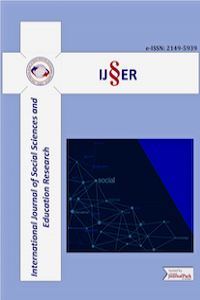Authentic leadership and follower job satisfaction: The moderating effect of leader emotional expressivity
This research attempts to explain the moderating effect of leader emotional expressivity on the relationship between authentic leadership and follower job satisfaction. Accordingly, quantitative data, collected via survey administration to front-line employees of service-rendering companies from Istanbul was used to test the hypotheses. The findings of this study revealed that the strength of leader emotional expressivity weakened the positive contributions of authentic leadership to follower job satisfaction for leaders who demonstrate a high level of authentic leadership. On the other hand, higher leader emotional expressivity compensates for the low levels of authentic leadership in terms of increasing follower job satisfaction.
Keywords:
Leadership, emotions, authentic leadership, leader emotional expressivity follower job satisfaction,
___
- Avolio, B. J., & Gardner, W. L. (2005). Authentic leadership development: Getting to the root of positive forms of leadership. The Leadership Quarterly, 16(3), 315-338.
- Ayça, B. (2016). Otantik liderlik davranışının iş tatmini ve örgütsel bağlılığa etkisinin incelenmesi ve otel işletmelerinde bir araştırma (Doctoral thesis, Haliç Üniversi-tesi, Istanbul, Turkey). Retrieved from https://tez.yok.gov.tr/UlusalTezMerkezi/tezSorguSonucYeni.jsp
- Bennis, W. (2003). On Becoming a Leader. Cambridge, MA: Perseus Publishing.
- Brayfield, A., & Rothe, H. (1951). An index of job satisfaction. Journal of Applied Psy-chology, 35(5), 307-311.
- Cooper, C. D., Scandura, T. A. & Schriesheim, C. A. (2005). Looking forward but learn-ing from our past: Potential challenges to developing authentic leadership theory and authentic leaders. The Leadership Quarterly, 16(3), 475-493.
- Eriksen, M. (2009). Authentic leadership: Practical reflexivity, self awareness, and self-authorship. Journal of Management Education, 33(6), 747-771.
- Gardner, W. L., Avolio, B. J., Luthans, F., May, D. R., & Walumbwa, F. (2005). Can you see the real me? A self based model of authentic leader and follower development. The Leadership Quarterly, 16(3), 343-372.
- George, J. M. (2000). Emotions and leadership: The role of emotional intelligence. Human Relations, 53(8), 1027-1055.
- Gezer, A. (2015). Otantik liderlik davranışlarının iş tutumlarına etkisi: Mersin ili finans sektöründe bir saha araştırması (Master’s thesis, Toros University, Mersin, Tur-key). Retrieved fromhttp://openaccess.toros.edu.tr/bitstream/handle/123456789/64
- Henderson, J. E., & Hoy, W. K. (1983). Leader authenticity: The development and test of an operational measure. Educational and Psychological Research, 3(2), 63-75.
- Ilies, R., Morgeson, F. P., & Nahrgang, J. D. (2005). Authentic leadership and eudaemonic well-being: Understanding leader-follower outcomes. The Leadership Quarter-ly, 16(3), 373-394.Judge, T. A., Locke, E. A., Durham, C., & Kluger, A. N. (1998). Dispositional Effects on Job and Life Satisfaction: The Role of Core Evaluations. Journal of Applied Psy-chology, 83(1), 17-34.
- Kring, A. M., Smith, D. A., & Neale, J. M. (1994). Individual Differences in Dispositional Expressiveness: Development and Validation of the Emotional Expressivity Scale. Journal of Personality and Social Psychology, 66(5), 934-949.
- Locke, E. A. (1976). The cause and nature of job satisfaction. In M.D. Dunnette (Ed.), Handbook of industrial and organizational psychology (pp. 1297-1349). Chicago, IL: Rand McNally.
- Luthans, F., & Avolio, B. J. (2003).Authentic leadership development. In K. S. Cameron, J. E. Dutton, & R. E. Quinn (Eds.), Positive organizational scholarship: Founda-tions of a new discipline (pp. 241-261). San Francisco: Barrett-Koehler.
- Neider, L. L., Schriesheim, C. A. (2011). The authentic leadership inventory (ALI): De-velopment and empirical tests. The Leadership Quarterly, 22(6), 1146-1164.
- Peus, C., Wesche, J. S., Streicher, B., Braun, S. & Frey, D. (2012). Authentic Leadership: An Empirical Test of Its Antecedents, Consequences, and Mediating Mechanisms. Journal of Business Ethics, 107(3), 331-348.
- Rubin, R. S., Munz, D. C., & Bommer, W. H. (2005). Leading from within: The effects of emotion recognition and personality on transformational leadership behavior. Academy of Management Journal, 48(5), 845-858.
- Shamir, B., & Eilam, G. (2005). What’s your story? A life-stories approach to authentic leadership development. Leadership Quarterly, 16(3), 395-417.
- Sparrowe, R. T. (2005). Authentic leadership and the narrative self. Leadership Quarterly, 16(3), 419-439.
- Sy, T., Côté, S., & Saavedra, R. (2005). The contagious leader: Impact of the leader’s mood on the mood of group members, group affective tone, and group pro¬cesses. Journal of Applied Psychology, 90(2), 295-305.
- Walumbwa, F. O., Avolio, B. J., Gardner, W. L., Wernsing, T. S., & Peterson, S. J. (2008). Authentic leadership: Development and validation of a theory-based measure. Journal of Management, 34(1), 89-126.
- Yukl, G. A. (2005). Leadership in organizations (6th ed.). New York: Prentice Hall.
- Yayın Aralığı: Yılda 4 Sayı
- Başlangıç: 2015
- Yayıncı: Mahmut DEMİR
Sayıdaki Diğer Makaleler
Ümit BULUT, Ahsen Seda KILIÇ BULUT
İletişim fakültelerinde sosyal medya eğitimi
Sercan ÖNCEN, Serkan AYDIN, Salih PINAR
Belediye meclislerinde etkinlik meselesi: Isparta örneği
Niran CANSEVER, Nilüfer NEGİZ, Seda EFE
Mustafa Enes IŞIKGÖZ, Melike ESENTAŞ, Mahmut IŞIKGÖZ
Seleukoslar döneminde Antiokheia’da sosyal ve kültürel yaşam üzerine analizler
